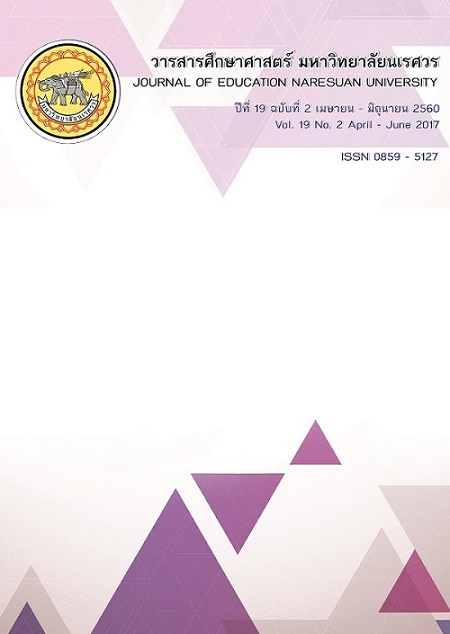การพัฒนารูปแบบการเรียนการสอนตามแนวทฤษฎีการสร้างความรู้และการจัดการเรียนรู้ STEM EDUCATION เพื่อเสริมสร้างการรู้วิทยาศาสตร์ สำหรับนักเรียนชั้นมัธยมศึกษาปีที่ 1
Main Article Content
Abstract
การวิจัยในครั้งนี้มีวัตถุประสงค์ 1) เพื่อศึกษาข้อมูลพื้นฐานสำหรับการพัฒนารูปแบบการเรียนการสอนตามแนวทฤษฎีการสร้างความรู้และการจัดการเรียนรู้ STEM Education เพื่อเสริมสร้างการรู้เรื่องวิทยาศาสตร์ สำหรับนักเรียนชั้นมัธยมศึกษาปีที่1 2) เพื่อสร้าง และตรวจสอบคุณภาพของรูปแบบฯ 3) เพื่อทดลองใช้ และศึกษาผลการทดลองใช้รูปแบบฯ 3.1) เปรียบเทียบการรู้เรื่องวิทยาศาสตร์ของนักเรียน ก่อนเรียน-หลังเรียน ด้วยรูปแบบที่พัฒนาขึ้น 3.2) ศึกษากระบวนการเรียนรู้วิทยาศาสตร์ของนักเรียน ดำเนินการวิจัยลักษณะวิจัย และพัฒนากับนักเรียนชั้นมัธยมศึกษาปีที่ 1 โรงเรียนภูคาวิทยาคม สพป. น่าน เขต 2 โดยการเลือกแบบเจาะจง จำนวน 30 คน เครื่องมือที่ใช้ในการวิจัย ได้แก่ รูปแบบฯ แบบวัดการรู้เรื่องวิทยาศาสตร์
ผลการวิจัย พบว่า 1) การรู้เรื่องวิทยาศาสตร์มีความสำคัญและเป็นสมรรถนะที่สำคัญยิ่งต่อนักเรียน จัดเป็นกิจกรรมการเรียนการสอนเพื่อพัฒนาการรู้วิทยาศาสตร์ประกอบด้วย 5 ขั้น 2) ผลการตรวจสอบคุณภาพรูปแบบโดยผู้ทรงคุณวุฒิ พบว่า รูปแบบที่พัฒนาขึ้นมีความเหมาะสมอยู่ในระดับมาก ( = 4.21, SD.=0.55) 3) ผลการทดลองใช้รูปแบบฯ พบว่านักเรียนที่มีคะแนนการรู้เรื่องวิทยาศาสตร์ใน3 ด้านสูงกว่าก่อนเรียน อย่างมีนัยสำคัญทางสถิติที่ระดับ .05 โดยแยกเป็นรายด้าน ด้านการระบุคำถามทางวิทยาศาสตร์ สูงกว่าก่อนเรียนอย่างมีนัยสำคัญทางสถิติที่ระดับ .05 ด้านการอธิบายปรากฏการณ์ทางวิทยาศาสตร์สูงกว่าก่อนเรียนอย่างมีนัยสำคัญทางสถิติที่ระดับ .05 ด้านการใช้ประจักษ์พยานทางวิทยาศาสตร์สูงกว่าก่อนเรียนอย่างมีนัยสำคัญทางสถิติที่ระดับ .05
THE DEVELOPMENT OF INSTRUCTION MODEL BASED ON CONSTRUCTIVIST LEARNING THEORY AND STEM EDUCATION APPROACH TO ENHANCE ANALYSIS THINKING AND SCIENTIFIC LITERACY FOR MATHAYOMSUKSA 1 STUDENT
The objectives of this research were to 1) study fundamental information for development the Instruction Model based on Constructivist Learning Theory and STEM Education Approach to Enhance Analysis Thinking and Scientific literacy for Mathayomsuksa 1 students. 2) Construct and verify the quality model. 3) Implement and study the results of the implementation. 3.1) Compare Scientific Literacy knowledge of students both before attending the class and after attending the class. 3.2) Study the students’ Science Learning process. The instructional model construction followed the research and development (R&D) model. The samples were 30 Mathayomsuksa 1 students, selected by purposive sampling method, of Phukawittayakom School in Nan province. The research instruments were the instructional model based on Constructivist Learning Theory and STEM education approach to enhance analysis thinking and scientific literacy and scientific literacy achievement test.
The Researching Results found Scientific Literacy and the Teaching and Learning Activities, have found that the 5 critical important steps. The assessment results for the Quality Format by the qualified experts found that the Development of Instruction Model has been appropriately improved at high level ( = 4.21, S.D. = 0.55). The applied results for the Development of Instruction Model have found that the students with the Scientific Literacy have the performance scores higher in 3 ways than before students attending the class, in the important meaning of statistical rate at .05 by separating the aspects as followed; Identifying scientific aspects, which is higher than before students attending the class, in the important meaning of statistical rate at .05. Explain Phenomena scientifically, which is also higher than before students attending the class, in the important meaning of statistical rate at .05. Using scientific evidence which is higher than before students attending the class, in the important meaning of statistical rate at .05.
Article Details
The owner of the article does not copy or violate any of its copyright. If any copyright infringement occurs or prosecution, in any case, the Editorial Board is not involved in all the rights to the owner of the article to be performed.


